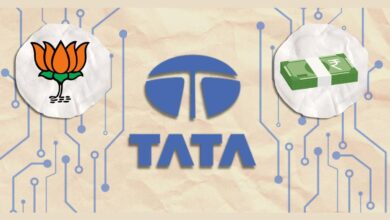Is the IIT Brand Fading? Declining Placements and Alarming Pay Gaps in 2024
Indian Institute of Technology, Bombay, considered one of the premier engineering institutes in India, has concluded its placement season for the graduating class of 2023-24. While there are some encouraging signs, this particular season has raised pertinent questions concerning the job market and the overall experience of students pursuing an engineering degree, even from the most reputed institutions.

The aggregate number of placements at IIT Bombay had declined. The institution had seen 1,516 students accepting job offers for the 2022-23 placement season, slipping to 1,475 for the 2023-24 season. This fall in placement came for the first time despite the 12% increase in the number of companies coming for campus recruitment-from 364 companies last year to 407 this year.
The fall in placements despite higher average salaries and increased participating companies indicates that the job market may get more selective, with employers probably looking at a smaller pool of highly specialized candidates.
High-Paid Offers and International Opportunities
Even while the total placements went down, high-value offers surged in this placement season. As many as 558 such offers were made with gross compensation higher than ₹20 lakh per annum, and 78 students accepted international job offers. A total of 22 students received offers with packages over ₹1 crore per annum, testifying to the continued attraction that IIT Bombay graduates have for top-end recruiters within and outside the country.
These high-end offers came mainly from sectors like information technology, finance, and consultancy, which are always considered the traditional strongholds of the graduating classes from IITs.
International offers reflect the technical and analytical skills students demand in the world market. However, the spread hints at the increasing polarisation among graduates- an elite few get very high salaries, while others are content with modest compensation packages.
Concerns over the lowest salary packages

While the top-end salaries stole the headlines, concerns have been raised over the lowest salary packages offered in the 2024 placement season. The lowest salary package offered to IIT Bombay graduates in 2023 was ₹6 lakh per annum.
However, the figure fell to ₹4 lakh per annum in 2024, with ten students accepting job offers in this range. This reduction in the minimum salary package has raised questions regarding the job market’s ability to absorb the entire range of graduates, even from a premium institution.
The fact that IIT graduates have accepted such low-paying jobs indicates a more significant problem within the job market. This means that while there is a great demand for the cream, a large segment of the student population may face difficulty getting jobs worthy of the expectations one usually associates with the IIT degree.
It also reflects the importance of securing a prestigious degree and the right specialization and skills to make a person stand out in an increasingly competitive job market.
The Role of Specialization in Job Market Success
Data from the 2024 placement season at IIT Bombay suggests that specialization is becoming essential to get highly-paid jobs. As analyzed by Maheshwar Peri of Careers360, an overwhelming 21% of the graduates were jobless after four years of hard work, a statistic that raises some seriously telling questions about the relevance of the present educational system in bringing forth job-ready students.
A graduate’s employability is influenced very much by the course or specialization they choose. 23% of students of IIT Madras did not get any jobs during the placement season in 2021 despite having the IIT tag.
This is not an isolated trend in IIT Madras; it reflects the greater reality of IITs, which have always seen poor job placements of their students in core engineering disciplines, especially those in sectors like manufacturing, as compared to their peers in more apparently marketable streams of study like computer science, data science, and finance.
Manufacturing has fewer job avenues to offer, and the companies prefer students from non-IIT colleges who will accept lesser salaries. A very critical situation is that the brand IIT may not be enough to promise a lucrative job. Employers increasingly seek job candidates with specialized skills and expertise that fit into the job market demand and are relevant to their requirements.
A Refined View of Salary Packages

While the media reports on the success stories of the graduates receiving crore-plus salary packages from IITs, the reality is not so bright. According to a study by recruitment experts published in The Economic Times, only 960 students across all IITs received salary offers of ₹50 lakh or more in 2022. This, quite frankly, constitutes a minority fraction among such a large number of graduates, many of whom receive offers in the more modest range of ₹10-16 lakh per annum.
An article by Devina Sengupta in The Mint also reported that some IIT graduates this year got offers as low as ₹6-8 lakh per annum. These figures seldom make headlines but serve as a grim reality that not all students graduating from IIT get the most lucrative job offers. The vast difference in pay packages could be due to the choice of specialization, the sector being employed in, and the geographical location of the job.
For example, IT services companies have slowly begun to target smaller engineering colleges and can recruit talent at much lower costs. Therefore, this is a more serious concern for the IIT graduate competing with a larger pool when there is essentially only a finite number of high-paying jobs. This also drives home the point that students cannot afford to stop learning or rest even after an IIT degree.
Communication and Presentation Skills
While technical skills are doubtless paramount, communication and presentation often remain the silent roadblocks preventing many graduates from landing their dream jobs. Conventionally, Indian education, even at the celebrated IITs, focuses on acquiring technical knowledge rather than soft skills like effective communication and presentation.
This void in their arsenal of skills becomes prominent during the placement season, wherein students fail to put their ideas across in interviews or do not impress prospective employers.
An online platform like Cambly, offering group classes with native English speakers, will prove very beneficial for such students in improving their communication skills. More importantly, it provides a safe, non-judgmental environment for students to practise fluency and build their confidence in spoken English – increasingly important in a globalized job market.
The Job Guarantee Myth

Another general myth associated with graduating from an IIT is the guarantee of one of the best jobs. While the brand name opens many doors, the brand name IIT does not provide a full guarantee of employment, especially in today’s fast-moving job market. The growth of IITs in different parts of the country, including relatively new campuses such as IIT Dharwad and IIT Jammu, increases the number of IIT graduates but not the number of available jobs.
Besides, the global economic climate has brought in additional hurdles. The tech startup sector, a significant recruiter of IIT graduates, has turned slow, with names such as Byjus, Goldman Sachs, and Amazon announcing layoffs. This has made the recruiters more conservative, with selection being made according to skill and experience rather than because of the tag of a degree.
This uncertainty has been further reiterated by the recent viral story of an IITian named Himanshu on social media. A person who has worked for reputed companies like Adobe, GitHub, and Flipkart had him getting laid off just two days after he joined Meta in the United States. His experience serves as a pointer to the volatile market that even a degree from an IIT and a strong resume may not guarantee job security.
The Pressure and Discrimination on IIT Campuses
Going to IIT is not only intellectually demanding, but it is also emotionally and mentally exhausting. The pressure of performance and expectations increases so much that one may feel stressed and anxious. It gets doubled because studies in IIT involve a lot of financial stress. In other words, money matters, ranging from ₹10-15 lakh, tuition fees, and living expenses.
The problems do not stop after admission into an IIT either. Discrimination and inequality on the campuses of IIT have also been pointed out to add to the stress and pressure on the students. For example, there is a rule at IITs that once a student gets a job offer, they will not be allowed further interviews, which some believe removes further opportunities.
These issues have come to the fore in recent years when a series of student suicides in the IITs shocked the country. IIT Madras, for instance, reported 14 student suicides in ten years due to academic pressure, discrimination, etc. The suicide of a Dalit student at IIT Bombay raised a countrywide furore, and Chief Justice Chandrachud asked if that was a testimony to what happens in our places of learning, alone a place of learning like IIT.
These incidents have triggered demands for the IITs to address the root causes of student stress, namely, better mental health support and implementing measures to ensure campus equality and inclusivity.
Unemployment and Stagnation in Indian Higher Education
While this article focuses on the placement report card of IIT Bombay, challenges in the employability of passing students from IIT indeed point to the general state of affairs of Indian higher education. According to a study by Niti Aayog, an alarming 48 per cent of engineers from Indian campuses remain jobless, pointing to the gap between schooling and employability in the country.
Higher education in India has expanded so that the number of those graduating is disproportionately much higher than the number of jobs available against which they may be gainfully employed. To be sure, the supply-demand mismatch has led to particularly alarming levels of graduate unemployment, even among IITs.
Also, the Indian economy, though growing fast, has failed to generate decent enough employment opportunities to keep pace with the increasing number of fresh graduates. The private sector, a traditional bastion for IIT graduates, faces slower growth and mounting competition.
Therefore, concerning the more significant challenges faced by Indian higher education, the IIT Bombay placement report for 2024 is, in fact, a microcosm. While the rise in average salaries is encouraging, the fall in aggregate numbers of placements, the increasing disparity in salary packages, and the troubles graduates face in finding jobs pointers to the fact that education and employability in India need far more comprehensive attention.
The 2024 placement season aptly highlights the strengths and weaknesses of the job market as faced by the graduating class of engineers at IIT Bombay. Although an encouraging feature is reflected in increasing average salaries, the general decreasing trend in placements and increased disparity between high and low wages is a question mark for IIT graduates as to where they go from here.
Specialization and skill improvement are, thus, a part of the key learning outcomes that the students must undergo. An excellent degree from a prestigious university no longer guarantees anything in such a fiercely competitive job market; graduates must have the specific set of skills and expertise that the employers desire.
The challenge will be how the IITs and other educational institutions cope with the rapidly changing nature of the job market to equip their graduates with the required skills and knowledge for their ultimate success. This may require a reviewed curriculum emphasising practical skills, communication, and adaptability.
This is, finally, the story of hope and caution-this is the story of IIT Bombay’s 2024 placement season. Behind the deluge of success stories, there are inalienable challenges to overcome if all graduates are to emerge successfully in a rapidly changing world.




